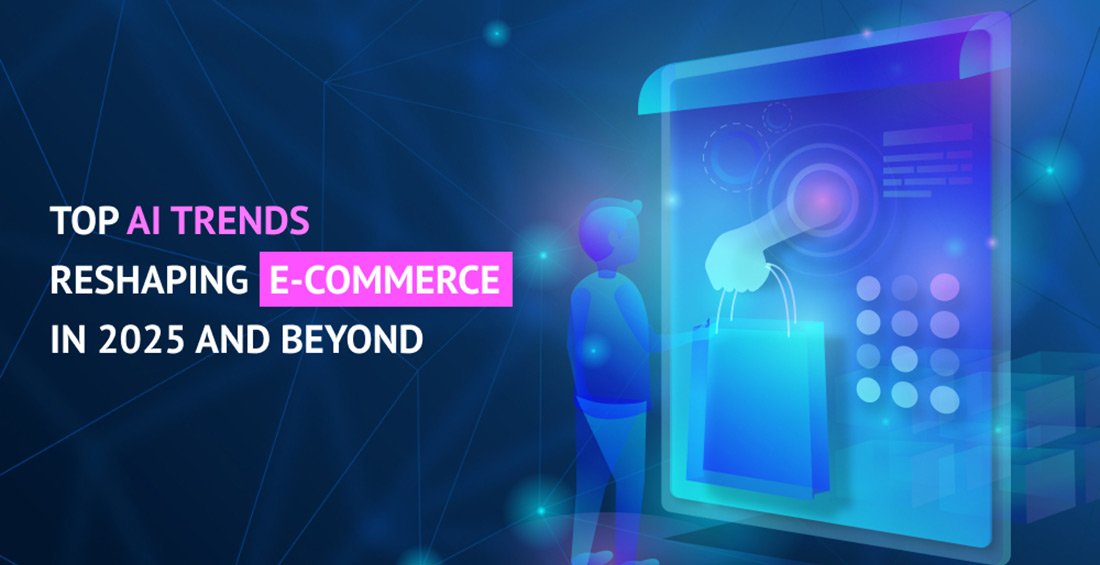The e-Commerce industry is undergoing a major transformation. Artificial Intelligence is no longer a side innovation; it’s at the heart of digital strategy. As we move deeper into 2025, brands are leveraging AI to boost customer experience, automate backend operations, and optimize decision-making with intelligent data.
At QualDev, we’ve seen how AI-driven solutions are helping e-Commerce businesses future-proof their platforms, streamline workflows, and deliver unmatched personalization.
Here are the top AI trends reshaping digital commerce in 2025 along with real industry use cases (without third-party endorsements) to bring each to life.
1. AI Agents Automating Repetitive Operations
AI agents are intelligent systems that automate customer service, order processing, and post-purchase communication. These agents reduce human workload, allowing teams to focus on innovation, growth, and brand strategy.
Case in Point:
One of our clients in the consumer electronics space is leveraging AI agents to efficiently handle support queries, manage product exchanges, and deliver personalized recommendations. This strategic use of automation has resulted in faster response times, improved customer satisfaction, and increased retention, particularly noticeable during high-traffic sales events like Black Friday and holiday seasons.
2. Hyper-Personalization via Predictive Analytics
With predictive analytics and real-time behavioral data, AI enables businesses to create one-to-one shopping journeys. These insights allow brands to recommend the right products at the right moment before customers even realize what they need.
Case in Point:
A beauty and wellness brand analyzed customer skin types, browsing history, and purchase frequency to deliver hyper-personalized bundles. This increased average cart size and reduced bounce rates across mobile sessions.
3. AI-Powered Sizing and Fit Recommendations
Return rates are a challenge for fashion, accessories, and footwear brands. AI can mitigate this by offering size suggestions based on customer measurements, past orders, and common fit issues.
Case in Point:
A luxury clothing label deployed an AI sizing model that analyzes customer profiles and product types to recommend the ideal fit. This reduced return rates by over 30% and helped build buyer trust especially with new customers.
4. Visual Search & AI-Powered Product Discovery
Visual AI allows users to search using images instead of text transforming how customers browse and find products. It’s especially impactful in design-led categories like home décor, jewelry, and fashion.
Case in Point:
A fine jewelry retailer implemented visual search, enabling customers to upload photos and receive visually similar options. This enhanced product discovery, increased engagement time, and improved mobile conversion rates.
5. Voice Commerce 2.0 – Context-Aware Conversations
Voice-assisted shopping is becoming more intelligent. Context-aware AI understands user intent, enabling natural conversations that help users reorder, compare, and discover products without lifting a finger.
Case in Point:
A home utility brand enabled voice-activated shopping via smart speakers. Customers could reorder essentials, get voice updates on order status, and receive spoken alerts on relevant deals all without opening an app. The result? A seamless, hands-free experience that aligned perfectly with on-the-go lifestyles.
6. Generative AI for Scalable Content Creation
Voice commerce is evolving beyond basic commands. With context-aware AI, users can now interact naturally placing orders, checking statuses, or exploring offers using just their voice. It’s shopping that fits into everyday moments, effortlessly.
Case in Point:
An online furniture store used AI to generate consistent and keyword-rich product narratives. This allowed faster product launches and better organic reach without increasing content team size.
7. AI for Post-Purchase Engagement & Retention
AI isn’t limited to the pre-sale journey. Post-purchase automation is helping brands retain customers and turn them into loyal advocates through intelligent workflows and personalized follow-ups.
Case in Point:
A D2C fashion brand deployed AI to send tailored follow-up emails, ask for product reviews, and suggest complementary items based on recent orders. This increased repeat purchases and helped create a lifecycle marketing flow without manual effort.
8. Dynamic Pricing & Smart Targeted Campaigns
AI monitors market shifts, competitor behavior, and consumer trends in real-time empowering brands to implement flexible pricing and launch segmented marketing campaigns that convert.
Case in Point:
In the athleisure category, brands are using AI to auto-adjust pricing during promotional windows and deliver targeted offers to returning users. This strategy has driven up ROI while reducing cart abandonment rates.
Final Thoughts
AI is no longer an optional upgrade; it’s the foundation of modern e-Commerce success. From personalized experiences and intelligent workflows to data-driven pricing and sustainability, the impact of AI is everywhere.
At QualDev, we’re working closely with e-Commerce businesses to integrate AI into their core platforms, processes, and customer journeys. Whether you’re launching your first AI feature or scaling an advanced model, now is the time to act.
The future of e-Commerce is intelligent, adaptive, and customer-first. Let’s build it together.
AI Driven Growth
